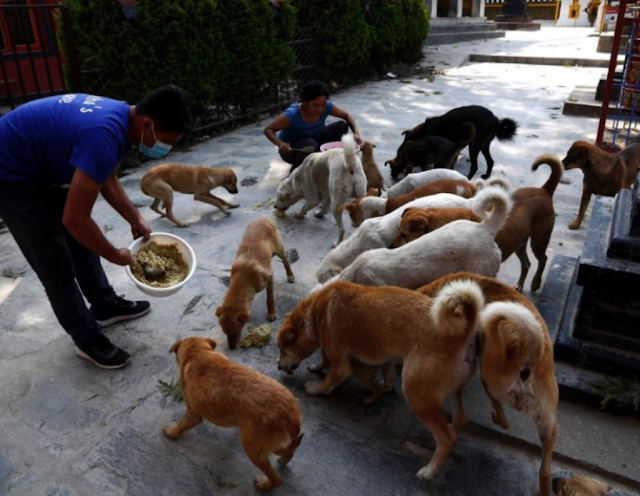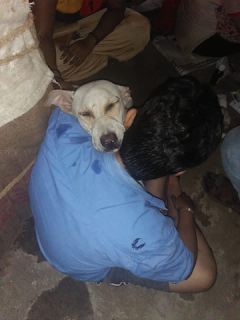Pui is on prednisone. He was in remission for 10 months when I felt the signs of swollen lymph nodes. Thanks to my obsession with my dogs, I caught it early and was able to get him back into treatment.
The first step was to reintroduce my dog to prednisone, which is an annoying medication. If you haven't tried it yet, you're in for a treat (sarcasm).
Prednisone is a steroid that is often prescribed to treat inflammation, severe skin allergies, cancer, nervous system disorders, and Addison's disease. It's very effective, at least for Scout. After a few days on prednisone, his lymph nodes were going down. But the side effects are miserable for all of us.
a Side Effects of Prednisone
The most common side effects of prednisone is ravenous hunger and thirst. Scout follows me around (physically or just with his eyes – yeah, creepy) waiting for his next meal. He's never been one to shy away from a meal, but he's never followed me around either. Now, he wants to eat everything, he whimpers all evening, and he's even resorted to eating stool, which in this case is pica (an eating disorder) and not a digestive issue (one of the causes of coprophagia).
It's miserable.
I don't want to feed him more food because he'll begin gaining weight, which isn't healthy for him. So, one evening, when I couldn't take the whining anymore, I began searching for ideas. I'm not the only one experiencing this with their dog, so there has to be a solution, right? RIGHT!
3 Ways to Satisfy the Hunger Caused by Prednisone
There are three things that we can do to alleviate the constant hunger our dogs are experiencing when taking prednisone.
1 – Talk to the Vet about Reducing the Dosage
DO NOT DO THIS WITHOUT FIRST GETTING APPROVAL FROM YOUR VET!
Yeah, I did just yell that because given the number of people who feel the need to share unqualified medical advice on social media, I wouldn't be surprised to learn that people are toying with the dosage without thinking of the ramifications. Stopping or tampering with the prednisone dosage can lead to serious, even life threatening, consequences.
So, pick up the phone and talk to your vet about the hunger. They are well aware of the side effects and can work with you on the dosage if that's the appropriate avenue. During Scout's first chemotherapy treatment, he went into remission quickly and the oncologist allowed me to slowly tamper down the prednisone over a few weeks. This time around, we're using a different chemotherapy medication (Laverdia) and started at a slightly lower dosage of prednisone, so I don't have high hopes that she's going to be on board with lowering the dose anytime soon.
2 – Talk to the Vet About an Alternative Drug
There are alternatives to prednisone. I don't know how effective they are, but I think it's worth a conversation with your veterinarian. I'm not current on prescription medication for dogs and new drugs are coming to the market all the time. I don't think it's a good idea to Google the alternative drugs for this blog post because we're talking about our dogs' lives and I don't want to send you down a rabbit hole to a drug that doesn't work, becomes obsolete or is taken off the market.
So, I'm encouraging you to ask your oncologist if there is an alternative drug to prednisone OR if there is a drug that you can add to the regimen that will allow you to reduce the dosage of prednisone. We won't know unless we ask, right?[[
3 – Feed Your Dog a Low Glycemic, Vegetable Meal
The last idea is to feed your dog. My concern is that Scout will gain weight if I increase how much I feed him daily. But, will he gain a lot of weight if I add a low glycemic meal to the day?
My oncologist is on vacation and the clinic is currently understaff and overwhelmed so I don't want to bother them with something that is, for us, a minor annoyance. So I began looking into feeding low-calorie foods until our vet returns from vacation.
I mixed up a low glycemic meal for Scout that included Bailey's Blend by Green JuJu and green beans. And a couple of days later, I picked up organic vegetables to puree as an alternative to Green JuJu.
Cauliflower is another low glycemic vegetable, but I don't like the way it smells in my veggie mix. I might ferment the vegetables, but if I go this route, I'll leave out the spinach – it smells awful when fermented.
How I Feed My Dogs
I feed my dogs a modified keto diet. This means that it's a high fat, moderate protein, low carb diet, but I don't test my dogs to confirm that they're in ketosis. My dogs eat a raw meal in the morning, raw goat's milk/kefir in the evening.
My dogs are fed between the hours of 9 am and 5 pm, allowing a 16 hour fast each night. Now that I've added a third meal, I've moved dinner up to 3 pm and Scout enjoys 1 cup of vegetables at 4:45 pm.
The vegetables are an excellent source of fiber, which helps him feel fuller, longer while supporting his gut, which is kind of squishy when he's going through treatment.
Prednisone Sucks, but There are Workarounds
None of these are perfect solutions and they may not work for every dog, but it's a start – right? The first night that I fed Scout vegetables, he still whined for about 30 minutes, but then he drank a gallon of water (exaggeration) and went to bed. The second night, it was like he had a hole in his stomach and the vegetables fell straight through. But I ignored the whimpering and he went to bed. The third night, was the same.
The stool eating continued despite adding digestive enzymes to his meals. This required me to drag my sick butt outside to pick up dog poop in the snow and accompany Scout outside (even at night) on potty breaks in case he found poop in the snow. This helped to curtail stool eating. However, I still need to watch out for pica. I've heard of dogs eating anything they could get in their mouths. We aren't there with Scout, but I am keeping services clean.
I did read that some people recommend using CBD oil, golden paste, or yucca schidigera. While each of these has anti-inflammatory benefits, I don't believe that they measure up to prednisone for my dog. He's been receiving CBD oil and golden paste daily for nearly a year and cancer still returned. But this is just my experience.
So, talk to your vet. And be patient with your dog.



